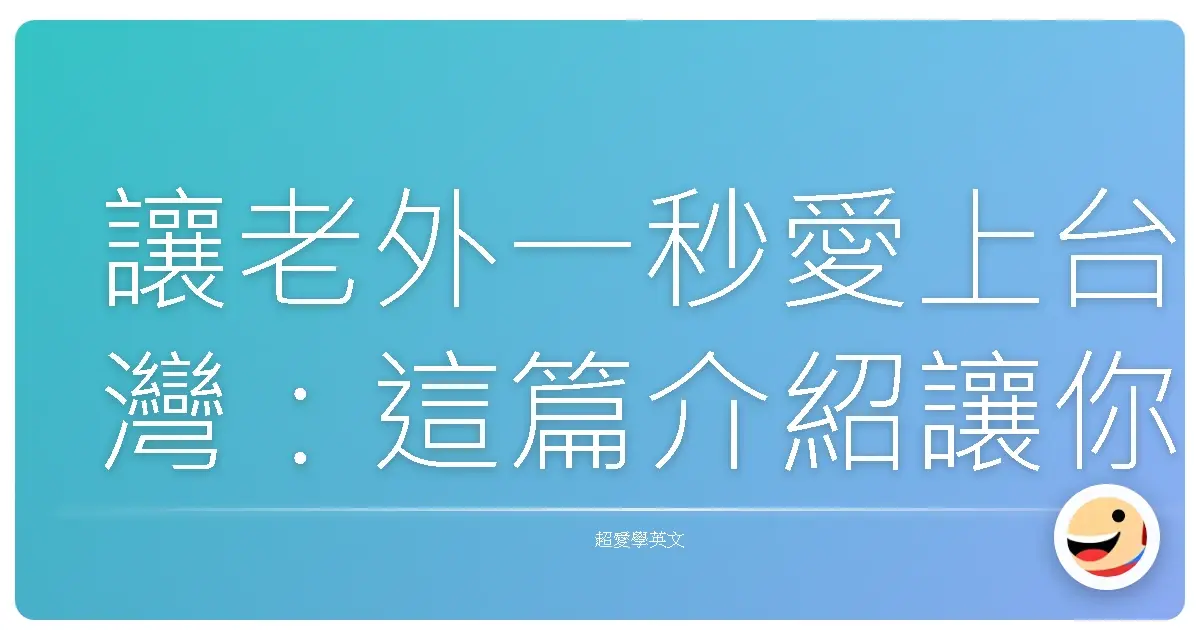
讓老外一秒愛上台灣:這篇介紹讓你講英文也像在講台語一樣親切!
用最道地的台灣味,讓外國朋友徹底愛上這塊寶島!
Hi, wanna talk about Taiwan? Let’s get started! (嗨,想聊聊台灣嗎?我們開始吧!)
想像一下,你跟一個剛認識的外國朋友聊天,他問你:「Hey, I heard Taiwan is a cool place. Tell me about it!」(嘿,我聽說台灣是個很棒的地方。跟我說說吧!)
這時候,你該怎麼用英文,把台灣的美好介紹給他,讓他覺得你講得超級生動有趣,而且還帶有濃濃的台灣味呢? 別擔心,這篇文章就是要教你,用最自然的英文,加上一些台灣特有的用語,讓你的介紹聽起來就像在跟朋友「泡茶聊天」一樣輕鬆!
First things first: “Formosa” is not just a name, it’s a feeling! (首先:「福爾摩沙」不只是一個名字,更是一種感覺!)
“Formosa” 這個字,對台灣人來說,不只是一個歷史名詞,更是一種懷舊、浪漫的感覺。當你跟外國朋友提到 Taiwan used to be called “Formosa,” meaning “beautiful island,” 時,他們會覺得你很懂台灣的歷史文化。
Example: “Taiwan used to be called ‘Formosa’ by the Portuguese. It literally means ‘beautiful island,’ and honestly, it still is!” (台灣以前被葡萄牙人叫做「福爾摩沙」,字面上的意思是「美麗的島嶼」,老實說,現在還是很美!)
Usage: 可以在介紹台灣的歷史背景時使用,讓對方了解台灣曾經有過這麼一個美麗的名字。
Explanation: “Formosa” 這個詞帶著一種歷史的浪漫感,可以讓你的介紹更有深度。
“Bao dao” is not just an island, it’s home! (「寶島」不只是一個島嶼,更是一個家!)
台灣人常常稱呼自己的家鄉為「寶島」。這個詞充滿了自豪和愛意。你可以這樣告訴外國朋友: “We Taiwanese often call Taiwan ‘Bao Dao,’ which means ‘treasure island.’ It shows how much we love and cherish this place.”
Example: “Welcome to Taiwan, our ‘Bao Dao’! We hope you’ll discover all the treasures it has to offer.” (歡迎來到台灣,我們的「寶島」!我們希望你能發現這裡所有的寶藏。)
Usage: 可以在歡迎外國朋友來到台灣時使用,表達你的熱情和對台灣的驕傲。
Explanation: “Bao Dao” 傳達了一種對土地的深厚情感,讓你的介紹更有人情味。
Food, glorious food! “Xiao chi” is the key to Taiwanese hearts! (食物,光榮的食物!「小吃」是抓住台灣人的心的關鍵!)
台灣的美食絕對是吸引外國朋友的一大利器!不要只會說 “Taiwanese food is delicious,” 要用更生動的方式介紹台灣的「小吃」。
Example: “Taiwan is a paradise for foodies, especially when it comes to ‘xiao chi’ – small eats, street food. Think juicy soup dumplings, savory oyster omelets, and stinky tofu that… well, you have to try it to understand!” (台灣是美食家的天堂,尤其是在「小吃」方面——小份的食物、街頭美食。想像一下多汁的小籠包、美味的蚵仔煎,還有臭豆腐,這個嘛……你必須親自嚐嚐才能明白!)
Usage: 介紹台灣美食時,一定要強調 “xiao chi” 的重要性。
Explanation: “Xiao chi” 不只是食物,更是一種生活方式,一種台灣的飲食文化。
“Night markets” are not just markets, they’re a cultural experience! (「夜市」不只是市場,更是一種文化體驗!)
台灣的夜市是絕對不能錯過的!不要只是說 “Night markets are popular,” 要用更有趣的方式描述夜市的熱鬧和活力。
Example: “Night markets in Taiwan are insane! Imagine a bustling street filled with food stalls, game booths, and people everywhere. It’s like a party every night!” (台灣的夜市超瘋狂!想像一條熱鬧的街道,擠滿了美食攤位、遊戲攤位,還有到處都是人。簡直就像每天晚上都在開派對!)
Usage: 介紹台灣的夜市文化時,可以強調它的熱鬧和多元。
Explanation: 夜市不只是買東西的地方,更是體驗台灣文化、品嚐道地美食、感受台灣人熱情的好地方。
“Bubble tea” is not just a drink, it’s a Taiwanese icon! (「珍珠奶茶」不只是一種飲料,更是一種台灣的象徵!)
珍珠奶茶已經成為台灣的代名詞。不要只是說 “Bubble tea is famous,” 要用更生動的方式介紹珍珠奶茶的美味和獨特。
Example: “Have you heard of bubble tea? It’s this amazing Taiwanese drink with chewy tapioca balls in sweet milk tea. It’s so addictive!” (你有聽過珍珠奶茶嗎?這是一種超讚的台灣飲料,裡面有QQ的珍珠,加上甜甜的奶茶。超級容易上癮!)
Usage: 介紹台灣的代表性飲料時,一定要提到珍珠奶茶。
Explanation: 珍珠奶茶已經成為一種文化符號,代表著台灣的創意和活力。
“Renqing wei” is not just kindness, it’s a way of life! (「人情味」不只是友善,更是一種生活方式!)
台灣最令人感動的就是濃濃的「人情味」。不要只是說 “Taiwanese people are friendly,” 要用具體的故事來展現台灣人的熱情和善良。
Example: “Taiwanese people are incredibly warm and welcoming. We call it ‘renqing wei’ – a kind of genuine hospitality. For example, if you look lost, someone will probably come up and offer to help you find your way.” (台灣人非常熱情好客。我們稱之為「人情味」——一種真誠的款待。舉例來說,如果你看起來迷路了,很可能會有人主動上前幫你指路。)
Usage: 介紹台灣人的特質時,一定要強調「人情味」。
Explanation: 「人情味」是一種難以言喻的溫暖,讓你在台灣感到賓至如歸。
“Jiayou” is not just cheering, it’s believing! (「加油」不只是加油,更是一種相信!)
「加油」是台灣人最常說的口頭禪。不要只是說 “Jiayou means ‘add oil’,” 要用更有力的方式表達「加油」的精神。
Example: “In Taiwan, we say ‘jiayou’ all the time! It’s like saying ‘go for it!’ or ‘you can do it!’ It’s a way to encourage people to keep going, even when things get tough.” (在台灣,我們無時無刻都在說「加油」!就像在說「衝啊!」或是「你可以的!」這是一種鼓勵人們繼續前進的方式,即使事情變得艱難。)
Usage: 介紹台灣常用的口頭禪時,一定要提到「加油」。
Explanation: 「加油」代表著一種積極向上、永不放棄的精神。
“Suibian” is not just “whatever,” it’s Taiwanese casualness! (「隨便」不只是「隨便」,更是一種台灣的隨性!)
「隨便」在台灣的語境下,有時候不是真的「隨便」,而是一種輕鬆自在的態度。要教外國朋友理解這種微妙的差異。
Example: “If you ask a Taiwanese person where they want to eat, they might say ‘suibian.’ It doesn’t necessarily mean they don’t care. It just means they’re easygoing and open to suggestions.” (如果你問一個台灣人想吃什麼,他們可能會說「隨便」。這不一定表示他們不在乎。只是表示他們很隨和,願意接受建議。)
Usage: 解釋台灣用語時,可以提到「隨便」的用法。
Explanation: 理解「隨便」的真正含義,可以幫助外國朋友更好地融入台灣文化。
“Hen” is not just “very,” it’s Taiwanese emphasis! (「很」不只是「非常」,更是一種台灣的強調!)
台灣人很喜歡用「很」來加強語氣。要讓外國朋友知道這個小小的用法,可以讓他們更了解台灣人的說話方式。
Example: “Taiwanese people love to use ‘hen’ to emphasize things. Like, ‘The food here is hen hao chi!’ means ‘The food here is very delicious!’” (台灣人很喜歡用「很」來加強語氣。像是,「這裡的食物很好吃!」就表示「這裡的食物非常美味!」)
Usage: 介紹台灣人常用的語氣詞時,可以提到「很」的用法。
Explanation: 掌握「很」的用法,可以讓你的英文聽起來更道地。
Don’t forget the mountains and the sea! (別忘了山和海!)
除了美食和文化,台灣的自然景觀也是一大亮點。
Example: “Taiwan might be small, but it has incredible mountains and beautiful coastlines. You can hike in the mountains in the morning and swim in the ocean in the afternoon!” (台灣可能很小,但它有令人難以置信的山脈和美麗的海岸線。你可以早上在山上健行,下午在海裡游泳!)
Usage: 介紹台灣的自然景觀時,可以強調它的多樣性和便利性。
Explanation: 台灣的自然美景,絕對能讓外國朋友驚艷。
Let them feel the “Taiwanese hospitality”! (讓他們感受到「台灣式的熱情」!)
要鼓勵外國朋友親自來台灣體驗。
Example: “You really have to come to Taiwan and experience it for yourself. The food is amazing, the scenery is breathtaking, and the people are incredibly welcoming. I promise you’ll fall in love with Taiwan!” (你真的要來台灣親身體驗一下。這裡的食物很棒、風景令人屏息,而且人們非常熱情好客。我保證你會愛上台灣!)
Usage: 在介紹的結尾,可以鼓勵外國朋友來台灣旅遊。
Explanation: 親身體驗勝過千言萬語,讓外國朋友親自感受台灣的美好。
A few extra tips to sound even more Taiwanese! (一些讓你的英文聽起來更台灣的小技巧!)
Use “leh” at the end of sentences: “The weather is really nice today, leh!” (今天天氣真好,咧!) “Leh” 是一種台灣人常用的語氣詞,可以讓你的語氣更輕鬆自在。
Say “xie xie” instead of “thank you” sometimes: While “thank you” is perfectly fine, saying “xie xie” (謝謝) occasionally can show that you’re embracing the local culture. (雖然說 “thank you” 很好,但偶爾說 “xie xie” (謝謝) 可以表示你正在融入當地文化。)
Don’t be afraid to use Taiwanese slang (carefully!): Words like “hao wan” (好玩 - fun) or “hao chi” (好吃 - delicious) are easy to pick up and use. Just be mindful of the context. (不要害怕使用台灣俚語(小心!):像是 “hao wan” (好玩 - fun) 或是 “hao chi” (好吃 - delicious) 很容易學起來並使用。只要注意語境就好。)
Remember, the key is to be yourself and let your passion for Taiwan shine through! (記住,關鍵是要做自己,並讓你的台灣熱情閃耀出來!)
By using these tips and examples, you can confidently introduce Taiwan to your foreign friends in a way that is both informative and authentically Taiwanese. Have fun sharing your love for this beautiful island! (透過使用這些技巧和例子,你可以自信地用一種既有知識性又真實台灣的方式向你的外國朋友介紹台灣。盡情分享你對這座美麗島嶼的愛吧!)